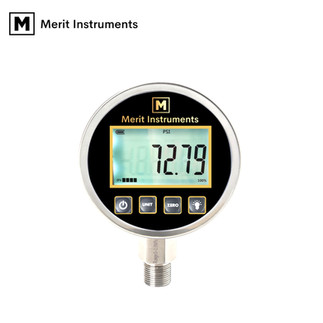Digital vs. Analog Pressure Gauges
- Merit Instruments

- Feb 15, 2024
- 3 min read
Updated: Aug 12, 2025
In the world of pressure measurement, the choice between digital and analog pressure gauges can often be a challenging decision. Both types have their own sets of advantages and disadvantages, making it crucial to understand your specific requirements before making a selection. In this article, we'll explore the differences between digital and analog pressure gauges to help you make an informed decision.
Understanding Analog Pressure Gauges
Analog pressure gauges have been a staple in industries for decades. They rely on mechanical components such as springs and Bourdon tubes to measure pressure. These gauges typically feature a dial with a pointer that indicates pressure readings on a scale.
Advantages of Analog Pressure Gauges:
Durability: Analog gauges are known for their robustness and ability to withstand harsh environmental conditions, including extreme temperatures and vibrations.
Real-time Reading: Analog gauges provide instant readings without the need for power sources or batteries.
Cost-Effectiveness: Analog gauges are often less expensive compared to their digital counterparts, making them a budget-friendly option for many applications.
Disadvantages of Analog Pressure Gauges:
Accuracy: Analog gauges may not offer the same level of precision as digital gauges, especially in highly sensitive applications.
Subjectivity: Reading analog gauges requires interpretation, which can introduce human error, particularly in situations where precise measurements are crucial.
Limited Features: Analog gauges usually lack advanced features such as data logging and digital output.
Exploring Digital Pressure Gauges
Digital pressure gauges, on the other hand, utilize electronic sensors to measure pressure and display the readings digitally on a screen. These gauges often come with additional features and functionalities tailored to modern industrial requirements.
Advantages of Digital Pressure Gauges:
Precision: Digital gauges offer higher accuracy and resolution, making them suitable for applications that demand precise measurements.
Ease of Reading: Digital displays provide clear, easy-to-read numerical readings, eliminating the need for interpretation.
Advanced Features: Many digital gauges come equipped with features like data logging, adjustable units, and programmable alarms, enhancing functionality and versatility.
Disadvantages of Digital Pressure Gauges:
Dependency on Power: Digital gauges rely on batteries or external power sources, making them susceptible to power failures and requiring regular maintenance.
Susceptibility to Damage: Electronic components in digital gauges may be more prone to damage from environmental factors such as moisture and electrical interference.
Cost: Digital pressure gauges tend to be more expensive upfront compared to analog gauges, although their long-term benefits may outweigh the initial investment.
Making the Right Choice
When it comes to choosing between a digital and analog pressure gauge, there is no one-size-fits-all solution. Your decision should be based on factors such as the required level of accuracy, environmental conditions, budget constraints, and specific application needs.
For rugged environments where durability and simplicity are paramount, analog gauges may be the preferred choice. Conversely, in applications where precision, advanced features, and digital compatibility are critical, digital gauges offer a more suitable solution.
Ultimately, the key is to evaluate your requirements carefully and choose the type of pressure gauge that best aligns with your needs and objectives. Whether you opt for the time-tested reliability of analog gauges or the cutting-edge technology of digital gauges, selecting the right instrument is essential for ensuring accurate and efficient pressure measurement in your operations.
Whatever your final choice may be, Merit Instruments has options that are right for your application. To learn more, visit www.meritinstruments.com today, or contact one of our knowledgeable team members who will be happy to assist you.









Comments